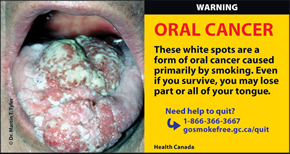Health Warnings
How acceptable is it for allegedly civilized societies to force a legal industry to plaster cigarette packages with medical pornography that countries such as Canada and Australia have adopted? How would the public feel if aborted fetuses were plastered on condom dispensers, dismembered bodies were painted on every automobile, or billboards showing smashed skulls appeared along the lengths of every ski slope?
But even if one believes that the ends justify these barbaric means, how effective are these warnings in scaring people into not starting smoking or stopping? Let's hear what the experts have to say:
Excerpt from: "Saying is not (always) doing: cigarette warning labels are useless"
- In summary, high personal relevance (smoking), in combination with low self-efficacy for the recommended action (quitting), leads to defensive reactions as a result of fear-arousing messages. This ‘psychological immune system’ helps in maintaining a positive self-image and may operate largely outside of awareness. Defensive reactions serve to get rid of the fear, not necessarily the threat. Policy makers should thus be reluctant to introduce cigarette warning labels and should instead focus on more effective interventions and policies.:
In fact, according to another study, "The effect of pictorial warnings on cigarette packages on attentional bias of smokers", those who are more at risk for smoking related diseases – the heavy smokers – in an effort to alleviate the anxiety these warnings cause them, crave cigarettes even more.
- Psychometric measures on anxiety and nicotine craving were administered. Light smokers showed an attentional bias towards packages without pictorial warnings while no effects were observed in the other groups. In heavy smokers attention allocation towards pictorial health warnings was associated with an increase of craving and anxiety. The results have a potential public health perspective as pictorial health warnings might be an effective strategy to reduce attentional bias towards cigarette packages of light smokers, while counterproductive effects in heavy smokers warrant further investigation. :
Contents
European health warnings
In 2003, new E.U. regulations required that one of two general warnings must be displayed, covering at least 30% of the surface on one larger side of the packet, with one of fifteen additional messages covering at least 40% on the other larger side of the packet.
Readers of this website may note – browse appropriate site portals regarding the varied warnings – that all of the seventeen imposed messages shown below are alarmist: either outright falsehoods or intentionally misleading suggestions and exaggerations.
The EU regulations provide their messages in several languages. The English versions are listed here.
The two general messages:
- Smoking kills
- Smoking seriously harms you and others around you
The fifteen additional messages:
- Smokers die younger
- Smoking clogs the arteries and causes heart attacks and strokes
- Smoking causes fatal lung cancer
- Smoking when pregnant harms your baby
- Protect children: don't make them breathe your smoke
- Your doctor or your pharmacist can help you stop smoking
- Smoking is highly addictive, don't start
- Stopping smoking reduces the risk of fatal heart and lung diseases
- Smoking can cause a slow and painful death
- Get help to stop smoking: [telephone]/[postal address]/[internet address]/consult your doctor/pharmacist
- Smoking may reduce the blood flow and cause impotence
- Smoking causes ageing of the skin
- Smoking can damage the sperm and decreases fertility
- Smoke contains benzene, nitrosamines, formaldehyde and hydrogen cyanide
Medical pornography Canadian style
Medical pornography Australian style
"Plain Packaging"
Complicating problems noted above are recent attempts by Tobacco Control to mandate so-called plain packaging. The cigarette packet designs advocated would very certainly not be "plain" as they would still glare with Tobacco Control's ever-favored and positively nauseous color photos (a couple of examples above on this page) of diseased body parts or corpses.
As has been proposed, frantic warnings with the gory graphics would appear at the top, and covering most of the surface, on both larger sides of each packet. What would be changed fundamentally – which is to say removed – are the identifying typefaces and "logos" of individual brands. Brand names would have to appear only in standardized typeface and only in black and white on the smaller portion of the pack remaining below the horrific image.
Apart from utterly incinerating the principle of intellectual property rights, and creating another practical horror for shop owners attempting to sort and distribute packets according to their brands, these "plain" packets would benefit nothing and nobody (excepting of course today's many busy cigarette counterfeiters, who would necessarily delight in having but one packet style to forge, in the place of dozens).
"Plain packaging" proposals are symptomatic of Tobacco Control megalomania; they descend precipitously on the slippery slope to government tyranny over all matters of personal choice and lifestyle. Author Christopher Snowdon has written perceptively on the subject.
It must also be noted that Tobacco Control continually demands ever more prominent display of gruesome images of death and disease on cigarette packages while it has fanatically and immorally blocked clearly attainable risk reduction of the cigarettes themselves for decades now.

